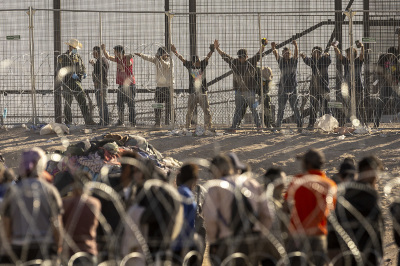A bipartisan immigration bill could unite divided Americans

Nothing divides the undivided like politics. And while there are several national political topics that create disagreement, few generate bitter dissension like immigration. The topic of immigration deeply divides many simply because it represents us as Americans in a broad way unlike any other national issue.
That’s why I’m encouraged by the recent bipartisan collaboration between Reps. Maria Elvira Salazar, R-Fla., and Veronica Escobar, D-Texas, to introduce the Dignity Act, a comprehensive immigration reform bill. Among other things, this bill primarily aims to strengthen border security and provide a clear path to legal status for millions of undocumented immigrants, including Dreamers and those currently residing with only Temporary Protected Status.
The bill seeks to bring needed reform to asylum processing and visa backlogs. The bill would reform the U.S. asylum system to adjudicate most asylum claims made at the border via an asylum officer within 60 days and prevent the release of most individuals from custody while they wait for a final determination on their claim. It updates key aspects of the U.S. immigration system with a targeted focus on protecting family unity and providing employment-based opportunities.
The bill also protects “documented Dreamers,” those who age out of status under a parent’s work-based visa once they turn 21 due to delays in visa availability. Notably, it establishes an immigration agency coordinator to oversee immigration functions and authorizes about $3.5 billion to improve processing and reduce backlogs.
As an evangelical pastor, what encourages me is that the Dignity Act takes a biblical approach to the issue of immigration. For example, Deuteronomy records God’s call to the nation of Israel to live in such a way that pleases him by reflecting his character. Deuteronomy 10:17-19 says that God, “ensures that orphans and widows receive justice. He shows love to the foreigners living among you and gives them food and clothing. So, you, too, must show love to foreigners, for you yourselves were once foreigners in the land of Egypt.”
While written to the ancient people of Israel, this charge is also consistent with the words and teachings of Jesus Christ and is still applicable to his followers today. In the very first chapter of the Bible, we see that “God created human beings in His own image.”
We are given a mandate to reflect the nature and activity of God in the manner of life we live. The reality that we are made in the image of God carries with it the truth that we are called to echo his character. Not only in our churches but in the marketplaces, offices, state and federal buildings, and all other places along the way.
A step of success for the Dignity Act is a step in reclaiming a national issue from deep polarization. And Americans want this immigration reform. In 2021, 56% supported making the legal immigration process easier and 55% supported providing a pathway to citizenship for undocumented immigrants. Additionally, a poll released In 2022 found that 70% of respondents supported a pathway to citizenship for undocumented immigrants.
The Dignity Act is the proper legislative response to the cry of many who are weary of extremes — and with continued bipartisan support, I believe we can see this bill signed into law. Until then, the burden is on all of us to help pave the way for others who can’t do it for themselves and develop opportunities for those searching for them.
If the hot-button issue of immigration didn’t speak to the core of who we are as people made in the image of God it wouldn’t resonate in mass. But it does. In the deepest way possible, we want our lives and our policies to reflect our beliefs and not our brokenness. When policy reflects our dissension, we leave behind the very people it was intended for. Passing the Dignity Act is an opportunity to commit together to delivering a better solution.
Mike Adkins is a pastor at Opendoor Church in Winterville, North Carolina





















